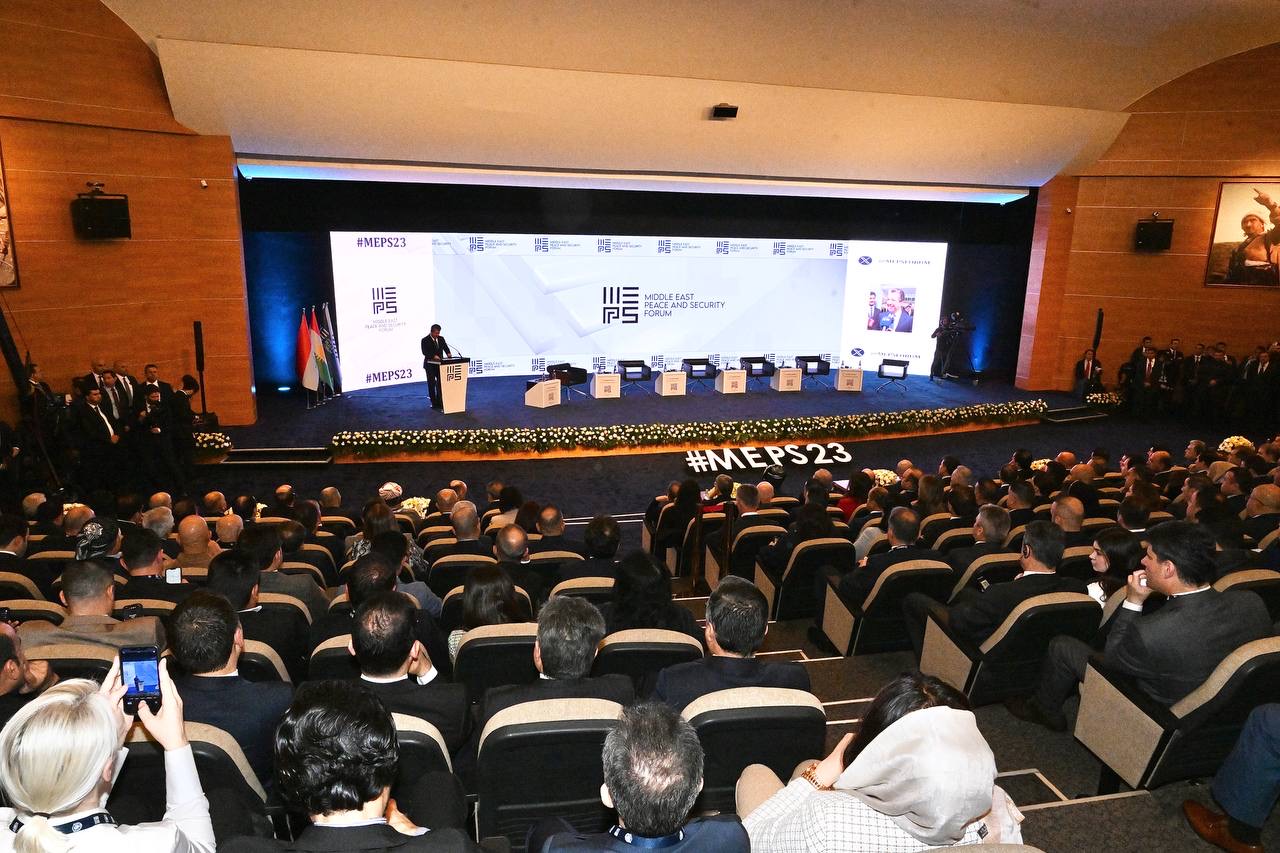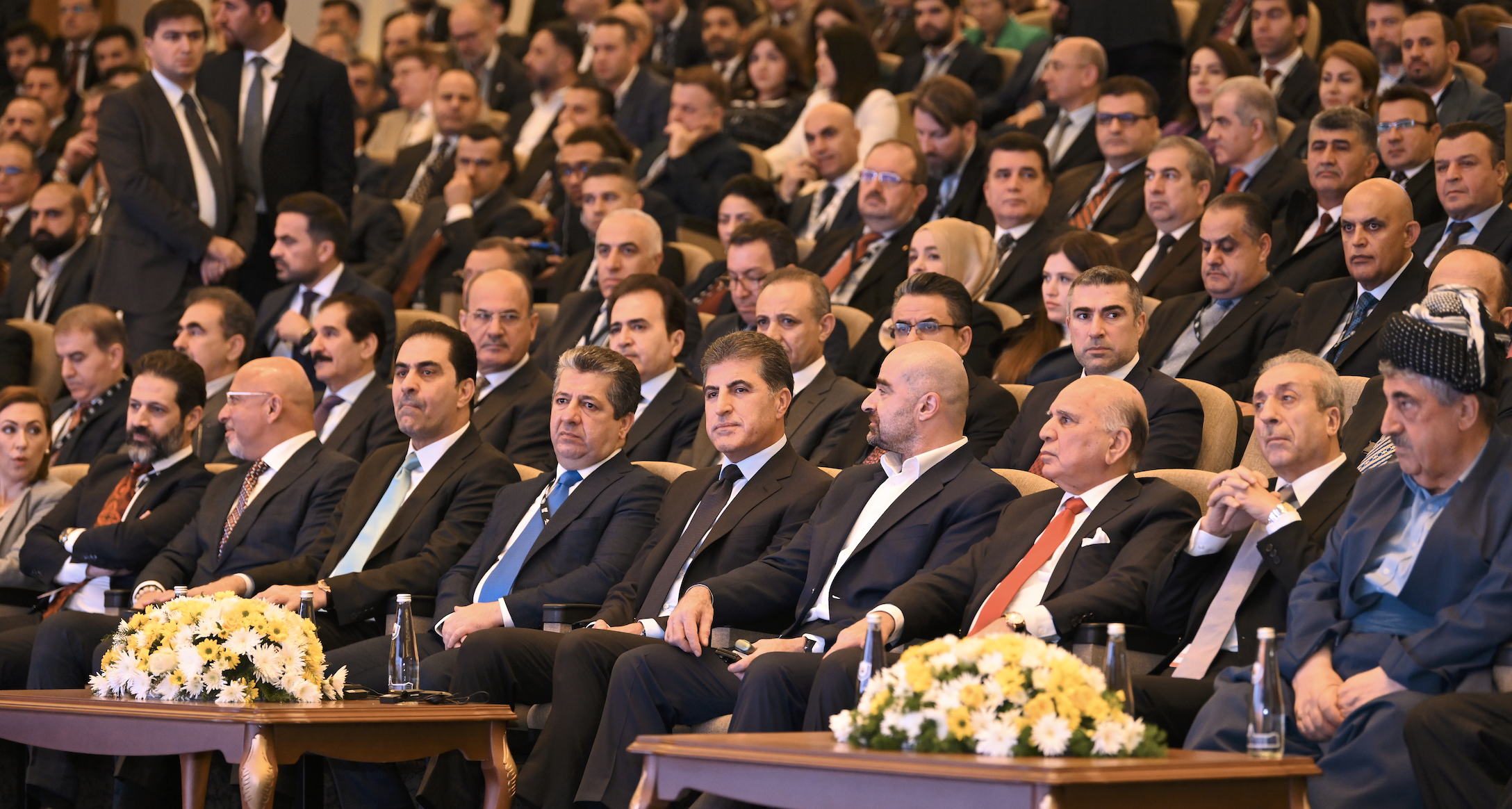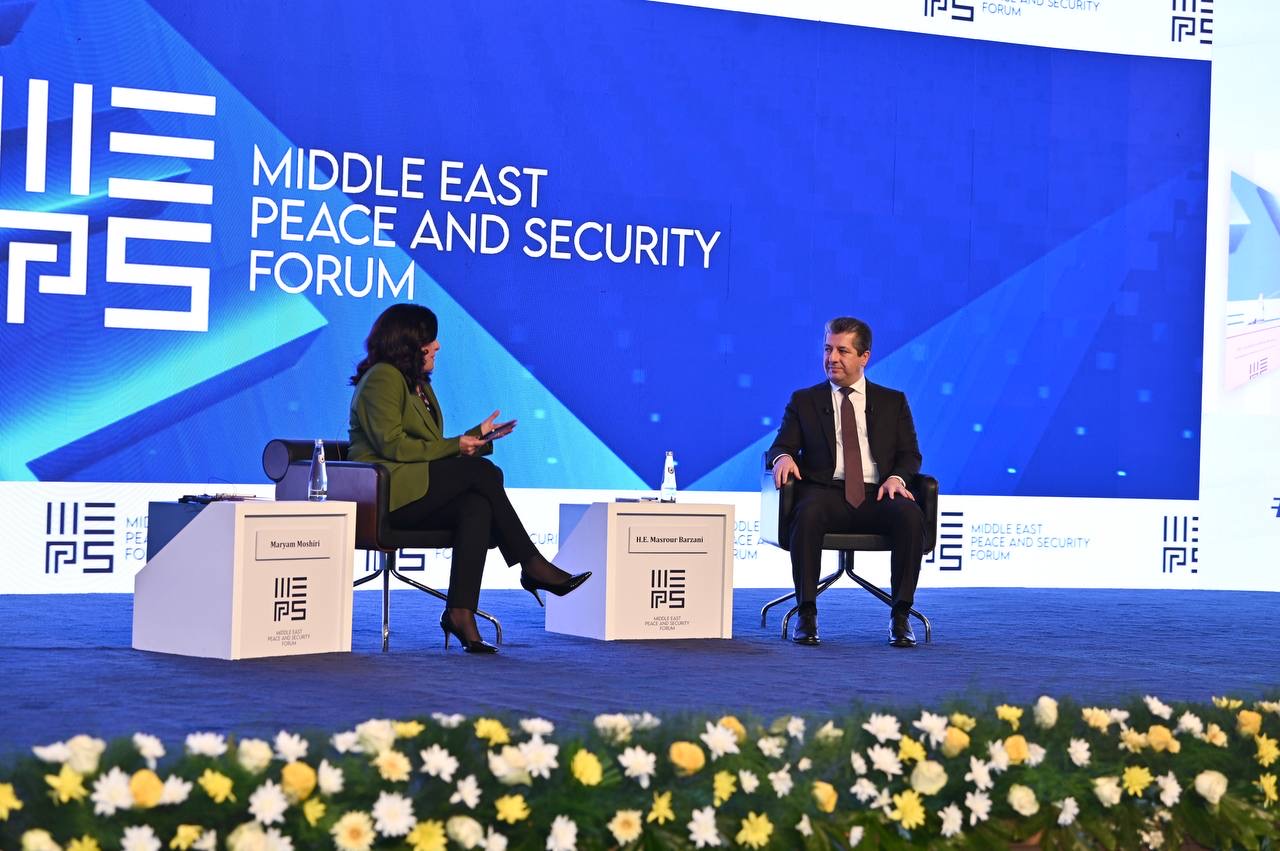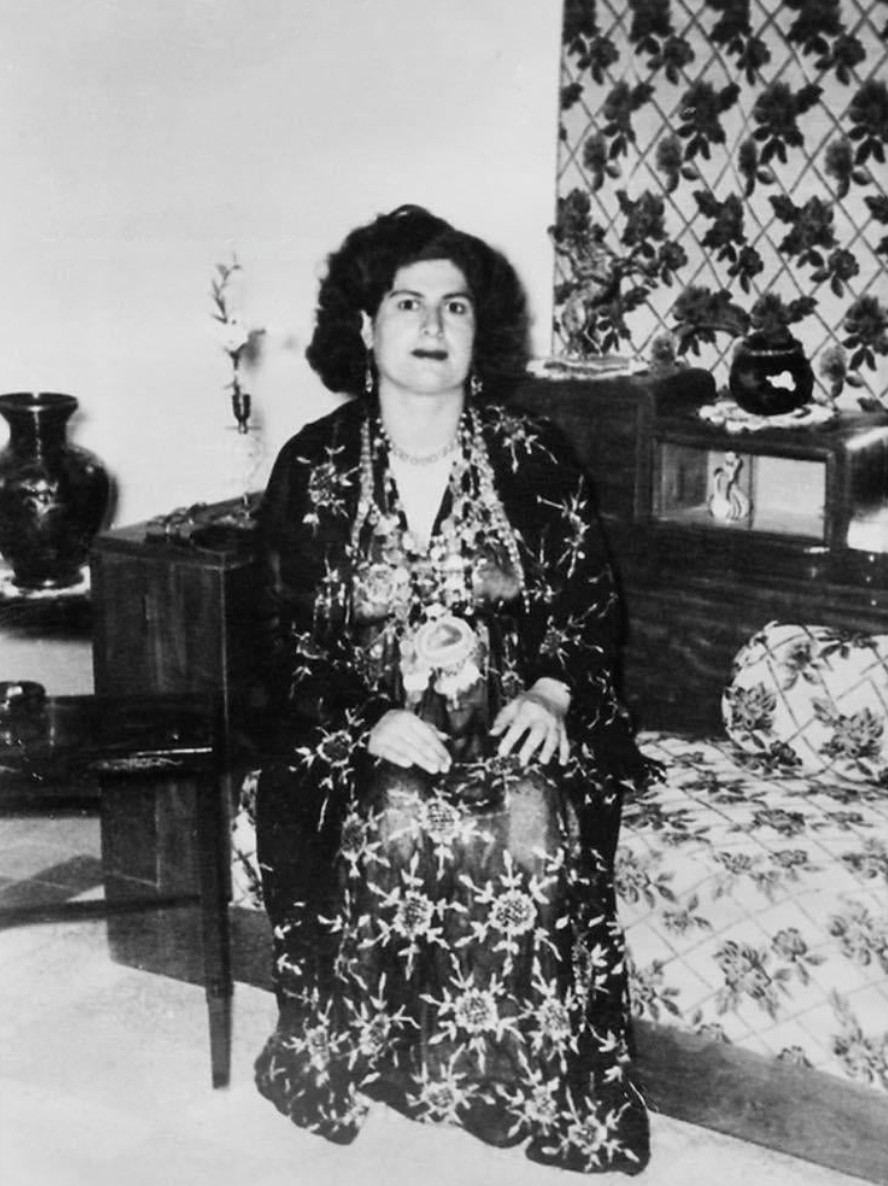From November 19-21, the Middle East Peace and Security (MEPS) Forum 2023 was held at the American University of Kurdistan (AUK) in Duhok, with the support of Kurdistan Chronicle.
“The agenda put together by the conference organizers does not shy away from a formidable array of issues faced by us all,” Kurdistan Regional Government (KRG) Prime Minister Masrour Barzani said during the event.
“Topics such as climate change, mass migration, extremism and its drivers, sustainability, and systems of governance are all up for debate. And I would expect that some of the discussions here will inform decision making and policy choices. For that is the test of gatherings such as this – how the intellectual heft displayed here can help drive meaningful outcomes.”
Building upon the conferences of previous years, MEPS Forum 2023 focused on the dynamics of great power competition in the Middle East and the prospects for peace in the region.
Discussions delved into the roles of the United States, Europe, and China in the region, as well as the future of Iraq. Additionally, there was a focus on the Gaza conflict, exploring the perspectives of key stakeholders, including the Arab Gulf states, Iran, and Turkey.
Moreover, Prime Minister Barzani underlined that the Kurdistan Region of Iraq (KRI) is located in a very strategic part of the world. “We have Turkey, we have Iran, we have the rest of Iraq and Syria, the whole Middle East. We are basically the glue. We are connecting all these different communities and thousands of years of history and different cultures together.”
“So, I think that we as the Kurds, instead of being elements of separation or destabilization, we want to unite the region. We want to bring more stability to the region. We want to be the beacon of development and progress and democracy, and these sorts of conferences are to show the world that we are different and we can be better.”

Climate focus
Moreover, this year’s conference there was extra focus on climate change, due to the UN Climate Change conference in the UAE starting on November 30 and the climate challenges that the KRI and Iraq are facing today.
“The MEPS Forum was right to choose climate change as one of the key topics for debate this year. The KRI, Iraq, and the Middle East are all at great risk from the challenges of water scarcity, rising temperatures and desertification, among other things,” Bayan Sami Abdul Rahman, Senior Advisor to Prime Minister Barzani for Foreign Affairs and Climate Change and former KRG Representative to the United States, told Kurdistan Chronicle. “We need to have an open dialogue to raise public awareness, highlight the problems facing us, and give credit where credit is due to those who are taking action. MEPS was an excellent platform for this.”
“It’s important for our people to know the scale of the challenges facing us but also to know that the KRG isn’t standing still and is taking steps to tackle the risks,” she added.

A meeting of minds
Dr. David Romano, Thomas G. Strong Professor of Middle East Politics at Missouri State University, told Kurdistan Chronicle that events such as the MEPS Forum are how societies communicate, both internally and across the world. “It’s a feedback mechanism and a communication mechanism where ideas can be tested, new ones can be generated, old ones can be re-evaluated, confirmed, or discounted.”
This year, the forum hosted speakers, diplomats, and guests from over 80 countries, and had prominent keynote speakers and guests such as former UK Prime Ministers Tony Blair and Boris Johnson, Prime Minister Barzani, KRG President Nechirvan Barzani, Iraqi Foreign Minister Fuad Hussein, and First Deputy Speaker of Iraq’s Parliament Muhsin Al-Mandalawi.
“It is actually more important than we might realize, in the sense that for the leadership here in Kurdistan, for instance, to understand and communicate, understand how the world sees the situation here, understand what advice the world is offering, what’s good advice, what’s bad advice, but also to communicate to the world what problems the Kurdistan Region is facing,” Professor Romano said.
“This isn’t just about sending or receiving a message. It’s about understanding and bringing people from abroad here to the KRI to see this situation and speak with people from here, which is a really important thing to do. These events cost money, of course, and it’s hard to see money being spent when a lot of people are without their salaries and so forth. But it’s part of the survival strategy for the KRI,” he concluded.
Ibrahim Dogus, Labor Party councilor of Lambeth in London, also told Kurdistan Chronicle that these forums are happening as there is growing conflict in the Middle East on different fronts, “whether it’s Israel and Palestine, or whether it’s Baghdad and the KRI.”
“So I think having these forums and making sure that you get people from all over the world with an interest in the region is quite important. It’s my first time and it won’t be the last, so I’ll be back here next year. Hopefully we’ll be aiming at organizing more functions and sessions to build bridges between the KRI and the UK.”

Showcasing Kurdistan
Moreover, the forum was a showcase of Kurdish unity, with senior officials from both the Kurdistan Democratic Party (KDP) and the Patriotic Union of Kurdistan (PUK) attending. Both KRG Deputy Prime Minister Qubad Talabani and PUK President Bafel Talabani attended the forum this year for the first time.
“One of the MEPS Forum’s most notable achievements is the demonstrated unity among political parties, particularly the PUK, KDP, and other parties. They sit together, showcasing a cohesive front for Kurdish unity,” Chiya Hamid Sharif, fifth-term KDP member of Parliament, told Kurdistan Chronicle.
“Furthermore, the forum plays a pivotal role in promoting the economic and political success of the KRI in the Middle East. While there has been focus on Egypt and Turkey, the Kurdistan Region has also been a democratic success.”
Dr. Randall Rhodes, President of AUK, told Kurdistan Chronicle that the event is also important now that today many people “get their information from social media and other online resources that are unsavory and without verification.”
“It’s extremely important to bring international experts, academics, diplomats, government officials, to Kurdistan, for face-to-face dialogue, so we can discuss in an accurate, realistic, and verifiable manner the realities of our current situation with the Middle East.”
Joel Rayburn, former U.S. Special Envoy for Syria, told Kurdistan Chronicle that the crisis in Gaza did not dominate the forum, unlike the IISS Manama Dialogue in Bahrain, and more topics were discussed. “It looks like the Manama Dialogue became the Gaza Dialogue. It kind of crowded all the other issues out of that space, but here that didn’t happened. So, I think this is good.”
Treefa Aziz, KRG Representative to the United States, told Kurdistan Chronicle that “holding the MEPS conference in the Kurdistan Region illustrates the KRI’s commitment to openness, transparency, and constructive dialogue. By welcoming global leaders, policy makers, and business leaders to its doorstep, Kurdistan demonstrates its dedication to building relationships based on mutual respect and shared understanding.”
“Furthermore, hosting the forum in the KRI provides a unique opportunity for participants to witness the region’s dynamism firsthand. It showcases the region’s achievements, challenges, and aspirations, thereby enabling participants to gain valuable insights into the intricacies of Kurdistan’s geopolitical landscape.”
“Lastly, bringing the MEPS Forum to the KRI decentralizes diplomatic discussions and empowers Kurdistan to shape its own narrative on the international stage. In fact, it is the bridge that strengthens the Kurdistan Region’s relationship with the international community and amplifies its voice on the global stage.”

Bridging ideas
In his closing remarks at the MEPS Forum, Dr. Honar Issa, Secretary of AUK’s Board of Trustees, also expressed special appreciation to Kurdistan Chronicle and Kurdistan 24 as the event’s media sponsors.
“The imperative of bringing together policymakers, scholars, and experts in his tumultuous times for the Middle East cannot be overstated,” Dr. Issa said. “We had a vision for MEPS Forum when we initiated the first dialogue in 2019: to develop a platform that would enable candid discussions and address the most pressing challenges to peace and stability in Middle East by going beyond conventional knowledge and wisdom, particularly when it came to Iraq and its future.”
“MEPS Forum is a bridge between experts, scholars, and decision makers, as well as a safe space for thinkers to engage with each other, to agree and disagree, and to find compromises when it comes the most contentious issues and topics. These are the sacred ideals that constitute the guiding principle for MEPS Forum.”
Dr. Issa also thanked the Chairman of AUK’s Board of Trustees, Prime Minister Barzani, for shaping the identity of AUK. “It is his forward-thinking vision that has underpinned the successful functioning of AUK.”

